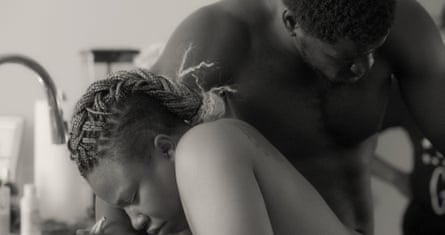‘The model is not working’: midwives navigate legal limbo as they save lives
Star August Ali has grown accustomed to life in legal uncertainty.
Ali, the first black certified professional midwife in the state of Illinois, helps women give birth in the comfort of their home. As she recalls in a new Guardian documentary, With Woman, Ali knows first-hand how harrowing it can be to give birth without the right kind of support. She gave birth to one child in a hospital because she said caregivers ignored her cries for help. She gave birth to someone else without assistance.
But as dedicated as the mother of four is to her work, as much as she believes in it, it has put her in danger. For years, Illinois did not license certified professional midwives, leaving midwives like Ali in something of a legal gray zone. Then in 2021, the state finally passed a law to create a licensing system, but there is still work to be done.
“We are still negotiating back and forth with the state regarding our scope of practice,” Ali said. “It’s very isolating.”
About 1 to 2% of all births in the United States occur at home, according to the Centers for Disease Control and Prevention. But amid the endless afterlife of the coronavirus pandemic, these numbers are rising: More births took place at home in 2021 than in any year in the past thirty years. Even the American College of Obstetricians and Gynecologists, which once strongly opposed all planned home births, has in recent years somewhat softened towards practiceas long as people are made aware of the risks.
Although interest in home births is increasing, the legal apparatus to protect them is not growing as quickly. According to the North American Registry of Midwives, which accredits certified professional midwives, thirty-six states, along with Washington DC, have regulatory laws to regulate or license certified professional midwives to handle home births. But fourteen states still don’t have a single regulatory program on the books. That gap makes these home birth midwives vulnerable to prosecution.
“The midwives who practice underground are risking their livelihoods, their safety and their freedom,” said Jamarah Amani, a certified midwife in Florida and director of the National Black Midwives Alliance. “And that also leaves communities without healthcare providers who then have to go it alone or choose to go it alone rather than going to the hospital.”
For now, Ali and her organization, Holistic Birth Collective, are focused on building a structure to support midwifery in Illinois. Ali and the collective’s Chief Strategy Officer, Callan Jaress, are particularly frustrated by provisions in Illinois’ new law that prevent midwives from providing out-of-hospital care to specific groups of people, such as those who have previously had a C-section — a provision that would disproportionately impact black people, who are more likely to have a cesarean section.
For such a wealthy country, maternal mortality rates among all races in the United States are staggeringly high, and getting worse. In 2018, there were 17.4 maternal deaths per 100,000 live births; by 2021, that number had risen to 32.9 maternal deaths per 100,000 live births, according to a March article in the Journal of the American Medical Association. As high as these numbers are, they are even more devastating among black women. In 2021, black women died 2.6 times more often than white women.

Study after study has also found that the American medical system’s approach to pregnancy and childbirth is steeped in racial bias and inequities. Black, Indigenous, and Hispanic women are much more likely than white women to report that their maternity caregiver has mistreated them, for example by berating or threatening them, having people in the delivery room that they did not consent to, or even physically assaulting them. to abuse. to a 2019 survey of more than 2,000 women who had at least one pregnancy between 2010 and 2016. Black, Indigenous, Asian and Latinx women are also twice as likely as white women to say a health care provider ignored them and denied them treatment. request for assistance, or has not responded to requests for assistance within a reasonable time.
A black woman who gave birth in California told study investigators that a doctor had refused to test her for amniotic fluid leakage. Instead, he insisted on testing her for a sexually transmitted infection – even though she had already undergone the test.
“I believe his assumption that I was leaking due to an STD and not a pregnancy complication was due to race and endangered my life and the life of my newborn,” the woman said. “I’ve been leaking fluid for a week.”
Nearly 30% of women who gave birth in a hospital said they had been abused. Only 5% of women who gave birth at home said the same.
Both Amani and Ali said that by coming into families’ homes and building relationships with them for hours, they can intrinsically and deeply understand what families need, much better than healthcare providers in hospitals. “This current model is not working,” says Amani. “The kind of care midwives provide is what we need to save lives.”
Ali has a goal: a midwife in every neighborhood. She loves seeing how empowered families can feel after a home birth; it’s the most satisfying part of her job.
“They were able to have the birth they envisioned and they knew they could do it because they were equipped to do it,” Ali said. “They just needed to be reminded of it and be in a space that facilitated and supported this.”
